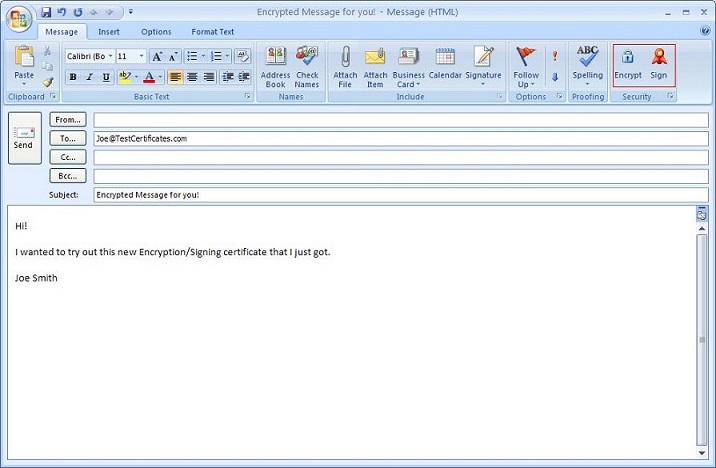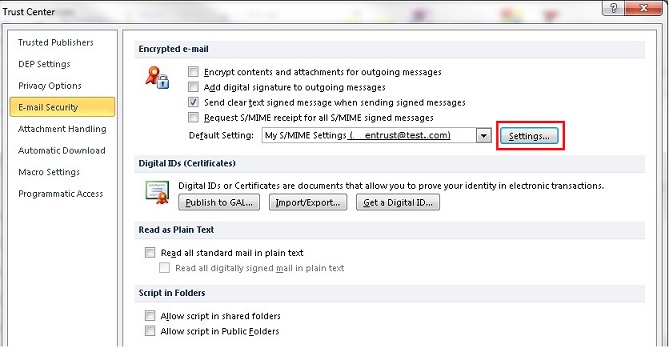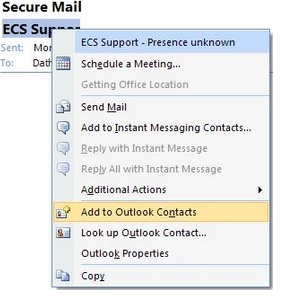How do I install my Secure Email (S/MIME) Certificate on Microsoft Outlook 2010?
Summary
Installation guide for Secure Email (S/MIME) certificate on Outlook 2010 on Windows OS.

Purpose: Secure Email (S/MIME) certificate installation guide
For Secure Email (S/MIME) certificate on Microsoft Outlook 2010 on Windows OS
The installation is in four parts:
1) Installing the S/MIME certificate in the personal certificate store
2) Updating Security Settings to link the S/MIME certificate to Outlook profile
3) Signing and encrypting messages
4) Storing a contact's secure email certificate (S/MIME exchange)
Part 1 of 4: Installing the S/MIME certificate in the personal certificate store
1. After your ECS Enterprise account administrator has approved the enterprise S/MIME request, or after you have placed your personal S/MIME order, you will be sent an email at the address listed on your request. Select that link.
2. Accept the Client Certificate Agreement that is presented in the browser that opens when you select the certificate pick-up link.
3. Once you have confirmed you can download the certificate, you are prompted with the below "Web Access Confirmation" pop-up. Select "Yes". The prompt is asking you to allow Entrus to perform digital certificate operations on your behalf, which is required to allow in order to complete the next steps.
4. Your browser will prompt you to download (open or save) a .p12 file. Open the file.
5. A Certificate Import Wizard will open. On the first prompt, select "Current User" and then Next.
6. Confirm you wish to import the .p12 file from the location shown by selecting
Next
.
7. When you requested the certificate, you were prompted to set up a password to protect the private key. Provide that password here. Select
"Mark key as exportable..."
in case you need to export your certificate in the future.
8. Select the option "Automatically select the certificate store based on the type of certificate".
9. Complete the Wizard by selecting Finish.
10. Your certificate has been successfully imported to the personal certificate store.
Part 2 of 4: Updating Security Settings to link the S/MIME certificate to Outlook profile
1. Select File> Options.
2. Select Trust Center > Trust Center Settings.
3. Select E-mail Security.
4. Click on the settings button.
5. Click on the Settings button to select the secure email certificate. Enter the below settings:
Security Setting Name:
Give the security setting a name. This is just a label.
Cryptographic Format:
S/MIME should be selected.
Signing Certificate:
Select your secure email certificate – click CHOOSE and select your certificate from the list.
Encryption Certificate:
Select your secure email certificate – click CHOOSE and select your certificate from the list.
6. Click OK.
Part 3 of 4: Signing and Encrypting Messages Now that you have your secure email certificate installed, you can Sign and Encrypt email messages.

To Sign an Email Message
, simply click the Sign button that now appears on a Compose Message email dialogue. There is no other setup required.
When users receive your email, they will see a message that the email has been digitally signed.
However, note to exchange secure emails with someone, there are some additional steps required.
Part 4 of 4: Storing a contact's secure email certificate (S/MIME exchange)
To Encrypt an Email Message, you will need to provide your public key to the party you wish to encrypt for, and vice versa.
The recommended way to do this exchange is to send the other party a
Signed
email. This email will contain a copy of your public key. The other party should send you a signed message as well, so that you can obtain a copy of their public key.
After receiving the
Signed
email containing a copy of the other person's secure email certificate, you need to store that contact and certificate.
1. Rick click on the sender name.
2. Select
Add to Outlook Contacts.
3. You can make sure the user's certificate has been stored by clicking on
Certificates.
4. Click
Save and Close
.
|
|
You can now exchange encrypted emails with that user. |
If you have any questions or concerns please contact the
Entrust Certificate Services Support
department for further assistance:
Hours of Operation:
Sunday 8:00 PM ET to Friday 8:00 PM ET
North America (toll free): 1-866-267-9297
Outside North America: 1-613-270-2680 (or see the list below)
NOTE: It is very important that international callers dial the UITF format exactly as indicated. Do not dial an extra "1" before the "800" or your call will not be accepted as an UITF toll free call.
| Country | Number |
| Australia |
0011 - 800-3687-7863
1-800-767-513 |
| Austria | 00 - 800-3687-7863 |
| Belgium | 00 - 800-3687-7863 |
| Denmark | 00 - 800-3687-7863 |
| Finland |
990 - 800-3687-7863 (Telecom Finland)
00 - 800-3687-7863 (Finnet) |
| France | 00 - 800-3687-7863 |
| Germany | 00 - 800-3687-7863 |
| Hong Kong |
001 - 800-3687-7863 (Voice)
002 - 800-3687-7863 (Fax) |
| Ireland | 00 - 800-3687-7863 |
| Israel | 014 - 800-3687-7863 |
| Italy | 00 - 800-3687-7863 |
| Japan |
001 - 800-3687-7863 (KDD)
004 - 800-3687-7863 (ITJ) 0061 - 800-3687-7863 (IDC) |
| Korea |
001 - 800-3687-7863 (Korea Telecom)
002 - 800-3687-7863 (Dacom) |
| Malaysia | 00 - 800-3687-7863 |
| Netherlands | 00 - 800-3687-7863 |
| New Zealand |
00 - 800-3687-7863
0800-4413101 |
| Norway | 00 - 800-3687-7863 |
| Singapore | 001 - 800-3687-7863 |
| Spain | 00 - 800-3687-7863 |
| Sweden |
00 - 800-3687-7863 (Telia)
00 - 800-3687-7863 (Tele2) |
| Switzerland | 00 - 800-3687-7863 |
| Taiwan | 00 - 800-3687-7863 |
| United Kingdom |
00 - 800-3687-7863
0800 121 6078 +44 (0) 118 953 3088 |


